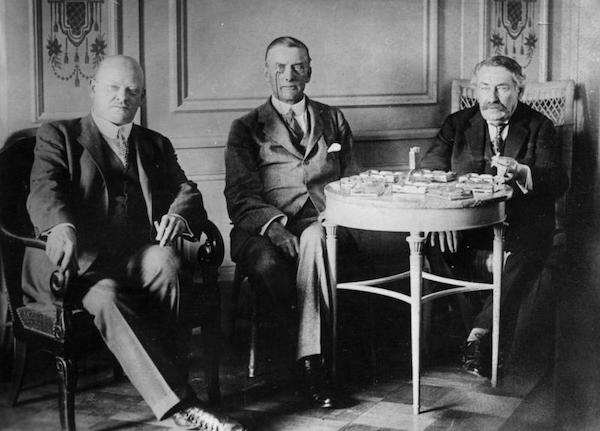Locarno Conference

From left to right, Gustav Stresemann, Austen Chamberlain and Aristide Briand during the Locarno negotiations
Between Ocotber 5-16 ,1925 a conference was held in Locarno Switzerland between the great powers of Europe. The conference was a result of communitcation between the French and British Foreign ministers and their German counterpart. Seven treates resulted and were signed in London on December 1. The treates that were signed guaranteeing peace in Europe. The pacts included a treaty of mutual guarantee of the Franco- German and Belgian-German borders. The treaties, which covered many potentially disputed areas, served to provide Europeans a sense of security.
The French occupation of the Ruhr had created renewed tensions in Europe. It also had developed a desire among both the French and the German to find a way to ensure future peace. The French desired a permanent alliance with Great Britain. Winston Churchill, who was Chancellor of the Exchequer in England, traveled to Paris in early 1925. French President Gaston Doumerge told him that the only way to ensure the future peace of Europe was to create an unbreakable bond between Britain and France. Churchill responded by saying, "The only real security against the renewal of war would be a complete agreement between England, France, and Germany. That alone would give the security that we are all seeking and that alone would enable the commerce of Europe to expand to such dimensions that the existing burdens of debts and reparations would be supportable and not crushing."
Churchill recognized that Germany would rearm at some point and felt that if the disputes between France and Germany were not resolved, eventually, there would be another war in which Britain would be drawn into. Despite some opposition, Churchill's position was accepted. The Germans were also receptive wanted to return to the world stage as equals. The French had no choice but to go along.
The final treaties were negotiated in Locarno, Switzerland, between October 5-16, 1925. The agreements were formally signed in London on December 1.
The most crucial agreement negotiated in Locarno was the Rhineland Pact between Germany, Great Britain, France, Belgium, Italy, and France. Under the agreement, Germany formally recognized its Western border as negotiated under the Versaille Treaty. Germany, France, and Belgium further pledged not to attack each other, while Great Britain and Italy acted as guarantors vowing to come to the defense of any party that was attacked. Additional agreements included Germany agreeing to arbitration over any border dispute with France and Belgium and Czechoslovakia and Poland.
The Treaties of Locarno significantly improved the atmosphere in Europe between 1925-1930. During that period, people referred to the Spirit of Locarno in which tensions between the major powers in Western Europe decreased markedly.
 >
>